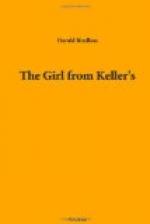A week later, Charnock sat, one afternoon, in the saddle of his gang-plow, tearing a row of furrows through the dusty sod. The sweating horses moved leisurely, and he did not urge them as he moodily watched the tangled grass part before the shares and vanish beneath the polished surface of the turned-up clods. He was breaking new soil, doing work that would be paid for in the future, and knew the reward of his labor might never be his. When he reached the end of the plowing he stopped and let the horses rest while he looked about.
One side of the long furrows gleamed in the strong light, and another team was moving towards him from the opposite end. The sun was hot, but the wind was fresh, and thin clouds of dust blew across the plain. Still the belt he was plowing was good soil; the firm black gumbo that holds the moisture the wheat plant needs. There was something exhilarating in the rushing breeze and glow of light, but Charnock frowned and wondered why he had worked so long. He had no real hope, and admitted that he had continued his spasmodic efforts because he could not face defeat.
For all that, he had not been fighting entirely for his farm. He wanted to keep his freedom; to break through trammels that were getting tighter, and try to regain something that he had lost. Sometimes he felt desperate, but now and then saw an elusive ray of hope. If he could hold out until harvest and reap a record crop——
Then his hired man, driving the other plow, waved his arm, and Charnock saw a rig lurch across a rise amidst a cloud of sand. It was the mail-carrier going his round, but he would not have come that way unless he had letters, and Charnock waited until the man arrived.
“Here’s your lot,” he said, taking out three or four envelopes.
Charnock’s hand shook as he opened the first, it was large and had an official look, and he found a number of unpaid accounts inside. Besides these, there was a lawyer’s letter, stating that certain dealers had instructed him to recover payment of the debts Charnock owed. He crushed the letter in his clenched hand and the veins stood out on his forehead, while his face got red. The blow he feared had fallen and he was ruined; but when the shock began to pass he felt a faint relief. It was something to be free from doubt and anxiety, and there were consolations. Now he was beaten, the line he must take was plain, and it had some advantages.
“You can quit plowing and put the teams in the stable,” he said to the hired man.
“Quit now!” exclaimed the other. “What about the machines?”
“Let them stop,” said Charnock. “It seems they belong to my creditors, who can look after them. I’m going to Concord and don’t know when I’ll be back.”
He went off towards the homestead and half an hour later drove away across the plain.




